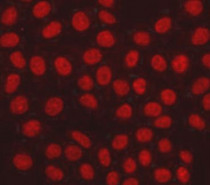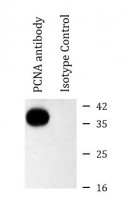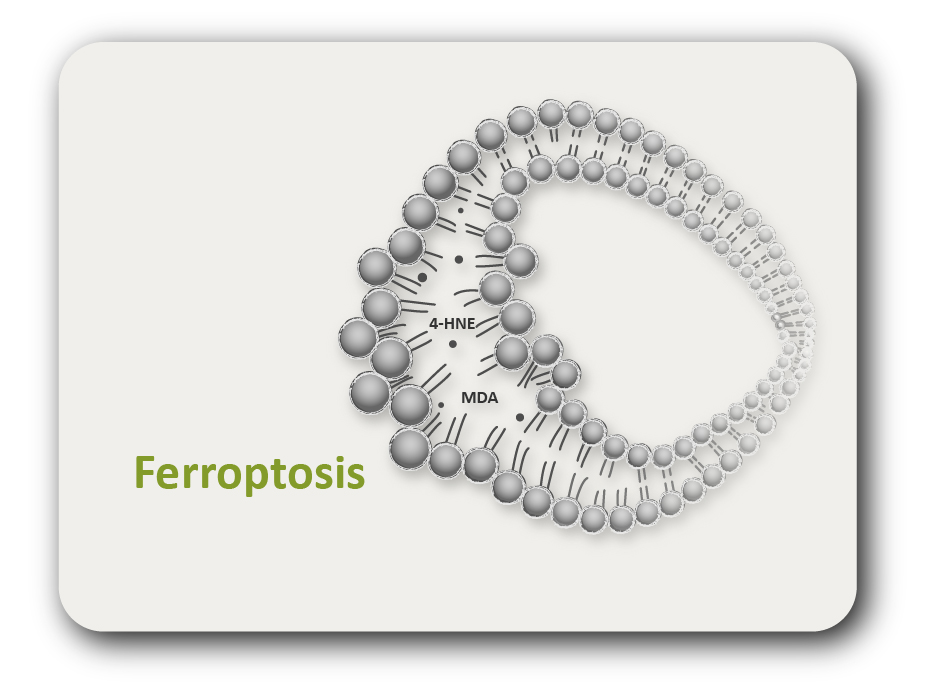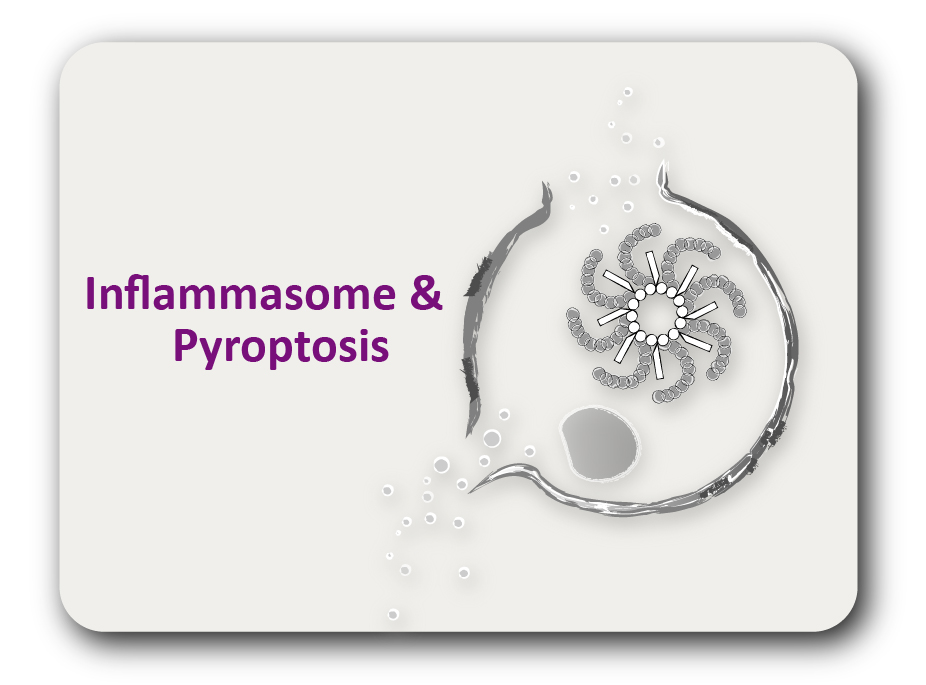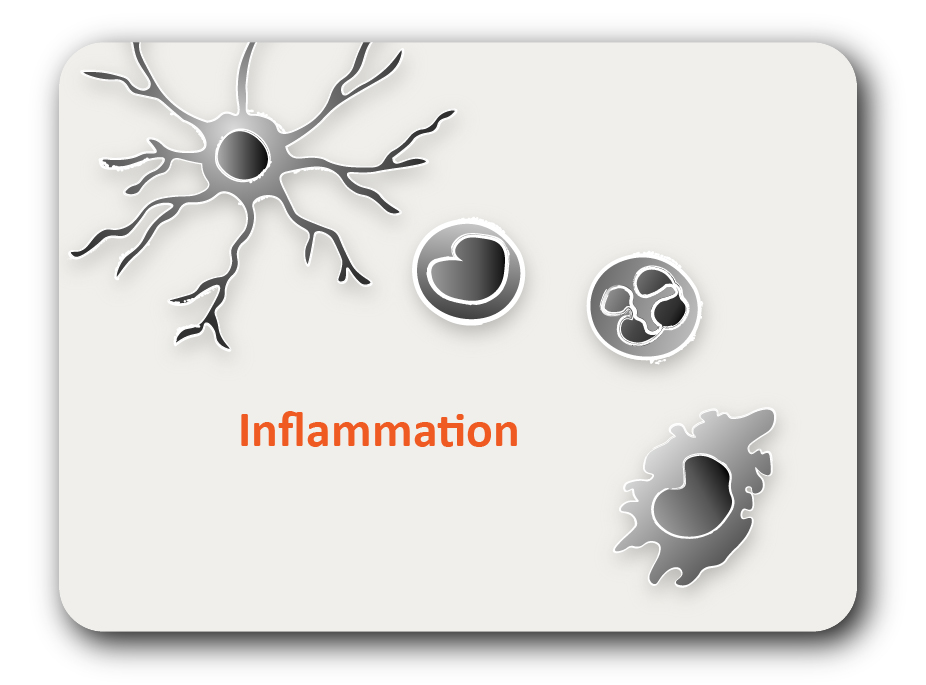ARG54142
anti-PCNA antibody
anti-PCNA antibody for ICC/IF,Immunoprecipitation,Western blot and Human,Mouse,Rat,Hamster,Monkey
Cancer antibody; Cell Biology and Cellular Response antibody; Controls and Markers antibody; Gene Regulation antibody

1
概述
| 产品描述 | Mouse Monoclonal antibody recognizes PCNA |
|---|---|
| 反应物种 | Hu, Ms, Rat, Hm, Mk |
| 应用 | ICC/IF, IP, WB |
| 宿主 | Mouse |
| 克隆 | Monoclonal |
| 同位型 | IgG2b |
| 靶点名称 | PCNA |
| 抗原物种 | Human |
| 抗原 | Purified recombinant human PCNA protein fragments expressed in E.coli. |
| 偶联标记 | Un-conjugated |
| 別名 | PCNA; ATLD2; Cyclin; Proliferating cell nuclear antigen |
应用说明
| 应用建议 |
|
||||||||
|---|---|---|---|---|---|---|---|---|---|
| 应用说明 | * The dilutions indicate recommended starting dilutions and the optimal dilutions or concentrations should be determined by the scientist. |
属性
| 形式 | Liquid |
|---|---|
| 缓冲液 | Ascites |
| 存放说明 | For continuous use, store undiluted antibody at 2-8°C for up to a week. For long-term storage, aliquot and store at -20°C or below. Storage in frost free freezers is not recommended. Avoid repeated freeze/thaw cycles. Suggest spin the vial prior to opening. The antibody solution should be gently mixed before use. |
| 注意事项 | For laboratory research only, not for drug, diagnostic or other use. |
生物信息
| 数据库连接 | |
|---|---|
| 基因名称 | PCNA |
| 全名 | proliferating cell nuclear antigen |
| 背景介绍 | Auxiliary protein of DNA polymerase delta and is involved in the control of eukaryotic DNA replication by increasing the polymerase's processibility during elongation of the leading strand.Induces a robust stimulatory effect on the 3'-5' exonuclease and 3'-phosphodiesterase,but not apurinic-apyrimidinic (AP) endonuclease,APEX2 activities.Has to be loaded onto DNA in order to be able to stimulate APEX2.Plays a key role in DNA damage response (DDR) by being conveniently positioned at the replication fork to coordinate DNA replication with DNA repair and DNA damage tolerance pathways.Acts as a loading platform to recruit DDR proteins that allow completion of DNA replication after DNA damage and promote postreplication repair:Monoubiquitinated PCNA leads to recruitment of translesion (TLS) polymerases,while 'Lys-63'-linked polyubiquitination of PCNA is involved in error-free pathway and employs recombination mechanisms to synthesize across the lesion. |
| 生物功能 | Auxiliary protein of DNA polymerase delta and is involved in the control of eukaryotic DNA replication by increasing the polymerase's processibility during elongation of the leading strand. Induces a robust stimulatory effect on the 3'-5' exonuclease and 3'-phosphodiesterase, but not apurinic-apyrimidinic (AP) endonuclease, APEX2 activities. Has to be loaded onto DNA in order to be able to stimulate APEX2. Plays a key role in DNA damage response (DDR) by being conveniently positioned at the replication fork to coordinate DNA replication with DNA repair and DNA damage tolerance pathways (PubMed:24939902). Acts as a loading platform to recruit DDR proteins that allow completion of DNA replication after DNA damage and promote postreplication repair: Monoubiquitinated PCNA leads to recruitment of translesion (TLS) polymerases, while 'Lys-63'-linked polyubiquitination of PCNA is involved in error-free pathway and employs recombination mechanisms to synthesize across the lesion. [UniProt] |
| 细胞定位 | Nucleus. |
| 研究领域 | Cancer antibody; Cell Biology and Cellular Response antibody; Controls and Markers antibody; Gene Regulation antibody |
| 预测分子量 | 29 kDa |
| 翻译后修饰 | Phosphorylated. Phosphorylation at Tyr-211 by EGFR stabilizes chromatin-associated PCNA. Acetylated by CREBBP and p300/EP300; preferentially acetylated by CREBBP on Lys-80, Lys-13 and Lys-14 and on Lys-77 by p300/EP300 upon loading on chromatin in response to UV irradiation (PubMed:24939902, PubMed:19419956). Lysine acetylation disrupts association with chromatin, hence promoting PCNA ubiquitination and proteasomal degradation in response to UV damage in a CREBBP- and EP300-dependent manner (PubMed:24939902). Acetylation disrupts interaction with NUDT15 and promotes degradation (PubMed:19419956). Ubiquitinated (PubMed:24939902, PubMed:20227374). Following DNA damage, can be either monoubiquitinated to stimulate direct bypass of DNA lesions by specialized DNA polymerases or polyubiquitinated to promote recombination-dependent DNA synthesis across DNA lesions by template switching mechanisms. Following induction of replication stress, monoubiquitinated by the UBE2B-RAD18 complex on Lys-164, leading to recruit translesion (TLS) polymerases, which are able to synthesize across DNA lesions in a potentially error-prone manner. An error-free pathway also exists and requires non-canonical polyubiquitination on Lys-164 through 'Lys-63' linkage of ubiquitin moieties by the E2 complex UBE2N-UBE2V2 and the E3 ligases, HLTF, RNF8 and SHPRH. This error-free pathway, also known as template switching, employs recombination mechanisms to synthesize across the lesion, using as a template the undamaged, newly synthesized strand of the sister chromatid. Monoubiquitination at Lys-164 also takes place in undamaged proliferating cells, and is mediated by the DCX(DTL) complex, leading to enhance PCNA-dependent translesion DNA synthesis. Sumoylated during S phase. Methylated on glutamate residues by ARMT1/C6orf211. |
检测图片 (3) Click the Picture to Zoom In
-
ARG54142 anti-PCNA antibody WB image
Western blot: 30 µg of HCT116 and COS7 cell lysates stained with ARG54142 anti-PCNA antibody at 1:1000 dilution.
-
ARG54142 anti-PCNA antibody ICC/IF image
Immunofluorescence: HeLa cells fixed in 100% methanol for 2 hours at -20°C and stained with ARG54142 anti-PCNA antibody at 1:100 dilution.
-
ARG54142 anti-PCNA antibody IP image
Immunoprecipitation: HeLa cell lysates were immunoprecipitated and stained with ARG54142 anti-PCNA antibody.

